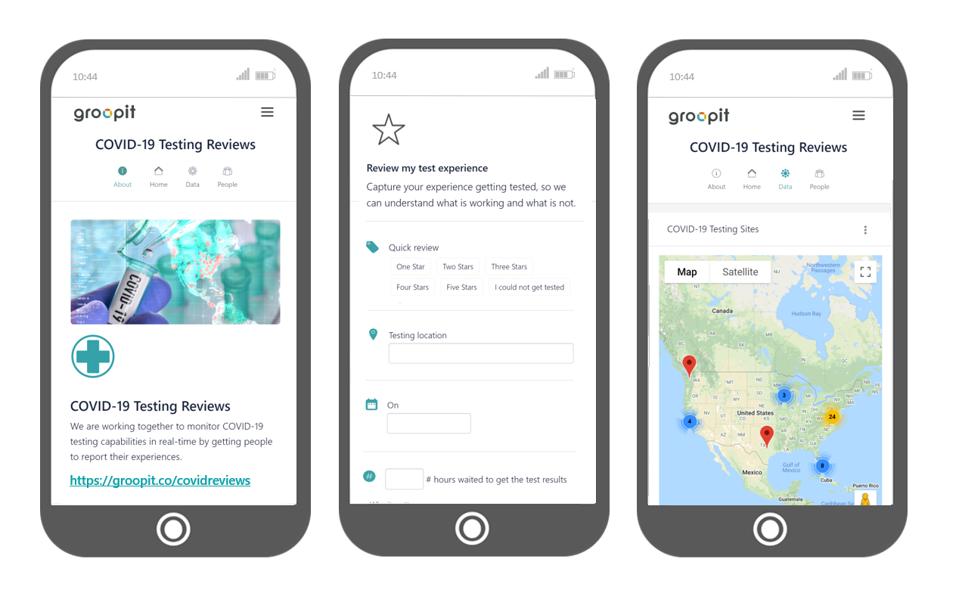Harvard Medical Students Partner With Crowdsolving Platform Groopit To Launch Yelp-Like Covid-19 Testing Review Platform
by Brianne Garrett
As Covid-19 coronavirus testing becomes more abundant and accessible—more than 15 million have been administered across the U.S. to date—so do questions about the various testing locations and types of tests being offered. But when you’re trying to discover this information, it’s not always easy to come by.
“At the onset of a pandemic, there was a lack of information sharing as well as a scarcity of certain resources,” says Dylan Cahill, a first-year student at Harvard Medical. “Early on we were thinking there might be some way in which we could create some sort of a crowdsourcing platform that would help connect people with these resources.”
This thought led Cahill and his friend J.C. Panagides, also a first-year med student at Harvard, to develop a way for people to get better information about coronavirus testing. More than half of Americans are turning to the Internet for essential guidance throughout the pandemic, but Cahill and Panagides wanted to ensure testing site information was accurate, relatable and, above all, first-hand.
The duo launched both the mobile and desktop version of their Covid-19 testing location app on March 17. Their initial aim was simply to provide information about where testing sites were located. “Our intentions were to track the location and operational capacity of sites as they opened around the country at a time when it was almost impossible to find a testing location or get specific, up to date information about that site,” Cahill.
Starting May 1, Cahill and Panagides expanded the information their site offered, asking people receiving coronavirus tests to share more about their experience, including details like waiting times and doctor-patient rapport. So far, some 50 reviews have come in from 16 states in locations mostly in the New England, Southeast, and West Coast areas.

“There’s a lot of value in people sharing their personal stories and experiences,” says Cahill. “Other people can read these stories and experiences and better know things like what they should have prepared for [testing] or how much time out of their day they should budget, and even understand the emotional side.”
To help build the platform, Cahill and Panagides sought assistance from Groopit. The Seattle-based crowdsolving service, which launched in 2018 and is backed by LinkedIn, PayPal, 23&Me, and Microsoft investors, works with customers interested in collecting real-time data about things like activist engagement, environmental monitoring and violence prevention. Because the company was already working with health-related scenarios, its software is HIPAA compliant, meaning it adheres to medical privacy and security regulations. That was a big leg up in helping develop their platform, Panagides says.
Since the start of the pandemic, gathering virus-related information has been a popular request among new clients, says Groopit CEO and cofounder Tammy Savage. A group of neighborhood associations in Nebraska, for example, are using Groopit’s services to share and compare Covid-19 data and identify local volunteers.
“The problem that we're solving 30 days from now is probably not exactly the problem that we're solving today,” says Savage. “One of the really important things about crowdsolving is that you can adjust in the moment and you’re always contributing the most important information in real-time and solving those problems in real-time.”
Cahill and Panagides are keeping in mind the long term benefits of their real-time data, and are confident it'll be useful in helping shape future coronavirus research.
“These sorts of details could be helpful for policymakers and public health officials who monitor trends—seeing what people are saying, what is working, what isn't and the gaps that need to be addressed,” says Cahill.